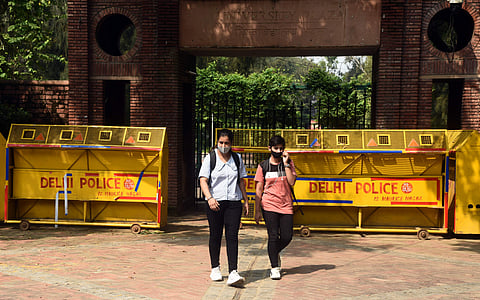

Jawaharlal Nehru University, Delhi University and Jamia Millia Islamia — all three premier institutes of Delhi saw a dip in the prestigious QS World University Rankings which were announced recently.
The prominent universities questioned the "screwed up" criteria which were adopted saying that they have noted a certain lack of transparency in some of the ranking parameters, as stated in a report by PTI.
It is Quacquarelli Symonds (QS), a global higher education analyst, who releases the rankings and this time, it was the 19th edition.
Delhi University (DU), the tenth best institution to feature in the rankings, slipped from the 501-510 bracket to the 521-530 bracket. Yogesh Singh, Vice-Chancellor, DU, shared that the university is analysing the data and accordingly, steps will be taken.
"We are analysing the data and working on it. We will take steps accordingly (to improve the ranking) like improving the student-teacher ratio," he said.
As far as JNU is concerned, it was in between 561-570 and came down to the 601-650 bracket.
Santishree Dhulipudi Pandit, Vice-Chancellor, JNU, contested the criteria that were adopted by the QS for ranking varsities. She also mentioned how they only look at "whether you have published papers or not", and not at diversity.
"IISC, IIT, JNU and any other universities cannot compete. Their (QS) criteria is screwed up. These QS ratings only look at whether you have published papers or not. It does not look at reducing social disparity and economic disparity, and I have told them where is student activism in either IITs or IISC. We (JNU) have diversity," she said.
Though she did agree that there is a need for improvement as far as JNU's infrastructure is concerned.
"They only see infrastructure and I agree there is no improvement (in infrastructure). We are working on it. We have got Rs 60 crore funding from the government for hostels. We are also looking for private funding. We are reeling under the Rs 100 crore deficit," she noted.
A lack of transparency was cited by Jamia Millia Islamia in a few parameters of the process of assessment.
"We too are determined to improve our rankings. We find that there is greater scope for improvement in the international faculty and international student ratio. These two parameters, however, are not purely in our purview and are also linked to policy decisions at the government level," Ahmad Azeem, Public Relations Officer, Jamia Millia Islamia said.
"We feel a better understanding of the ranking process will not only help us to know our position in the ranking universe, but also act as feedback for further improvement," he said.
It was the Indian Institute of Science (IISc), Bengaluru, that was deemed as the fastest rising South Asian University among the coveted QS World University Rankings top 200 varieties as it gained 31 places. Four IITs also featured in the category and rose in ranks when compared to the previous edition.
